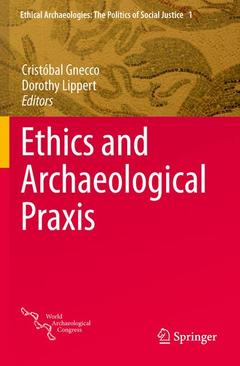Ethics and Archaeological Praxis, 2015 Ethical Archaeologies: The Politics of Social Justice Series, Vol. 1
Coordonnateurs : Gnecco Cristóbal, Lippert Dorothy

Restoring the historicity and plurality of archaeological ethics is a task to which this book is devoted; its emphasis on praxis mends the historical condition of ethics. In doing so, it shows that nowadays a multicultural (sometimes also called ?public?) ethic looms large in the discipline. By engaging communities ?differently,? archaeology has explicitly adopted an ethical outlook, purportedly striving to overcome its colonial ontology and metaphysics. In this new scenario, respect for other historical systems/worldviews and social accountability appear to be prominent. Being ethical in archaeological terms in the multicultural context has become mandatory, so much that most professional, international and national archaeological associations have ethical principles as guiding forces behind their openness towards social sectors traditionally ignored or marginalized by their practices. This powerful new ethics?its newness is based, to a large extent, in that it is the first time that archaeological ethics is explicitly stated, as if it didn?t exist before?emanates from metropolitan centers, only to be adopted elsewhere. In this regard, it is worth probing the very nature of the dominant multicultural ethics in disciplinary practices because (a) it is at least suspicious that at the same time archaeology has tuned up with postmodern capitalist/market needs, and (b) the discipline (along with its ethical principles) is contested worldwide by grass-roots organizations and social movements. Can archaeology have socially committed ethical principles at the same time that it strengthens its relationship with the market and capitalism? Is this coincidence just merely haphazard or does it obey more structural rules? The papers in this book try to answer these two questions by examining praxis-based contexts in which archaeological ethics unfolds.
Chapter 1: An entanglement of sorts: archaeology, ethics, praxis, multiculturalism.-Section 1: Is there a global archaeological ethics? Canonical conditions for discursive legitimacy and local responses.- Chapter 2: An Indigenous anthropologist’s perspective on archaeological ethics.- Chapter 3: Both sides of the ditch: the ethics of narrating the past in the present.- Chapter 4: Against global archaeological ethics: critical views from South America.- Chapter 5: Archaeology and ethics. The case of Central-Eastern Europe.- Chapter 6: Europe: beyond the canon.- Chapter 7: New worlds: ethics in contemporary North American archaeological practice.- Section 2: Archaeological ethics in the global arena: emergences, transformations, accommodations.- Chapter 8: Chapter Archaeology and capitalist development: lines of complicity.- Chapter 9: Archaeology and capitalism: successful relationship or economic and ethical alienation?.-Chapter 10: Trading archaeology is not just a matter of antiquities. Archaeological practice as a commodity.- Chapter 11: The differing forms of public archaeology: where we have been, where we are now, and thoughts for the future.- Chapter 12: Ethics in the publishing of archaeology.- Chapter 13: Patrimonial ethics and the field of heritage production.- Chapter 14: Archeologies of intellectual heritage?.- Chapter 15: Just methods, no madness: historical archaeology on the Piikani First Nation.
Cristóbal Gnecco is Professor in the Department of Anthropology at the University of Cauca (Colombia), where he works on the political economy of archaeology, the geopolitics of knowledge, and the discourses on alterity. He currently serves as Chair of the Ph.D. Program in Anthropology at his university and as a co-editor of the journals Archaeologies and Arqueología Suramericana.
Dorothy Lippert, National Museum of Natural History, Washington, DC.
Examines the relatively new phenomenon of archaeology and market capitalism in a mutually beneficial relationship
Includes a special feature, a virtual forum at the end of each section in which the editors will present the authors with a list of questions for the section authors and perhaps a few additional authors to discuss
Discusses and compares specific case studies from Europe, North America, South America, Central America Australia, South Asia, South-East Asia, and Africa
Includes supplementary material: sn.pub/extras
Date de parution : 03-2016
Ouvrage de 258 p.
15.5x23.5 cm
Disponible chez l'éditeur (délai d'approvisionnement : 15 jours).
Prix indicatif 116,04 €
Ajouter au panierDate de parution : 11-2014
Ouvrage de 258 p.
15.5x23.5 cm
Mots-clés :
archaeological practice and ethics; capitalism and archaeology; community archaeology; ethical principles of archaeology; ethical principles of archaeology; ethics of public archaeology; indigenous viewpoints on the practice of archaeology; local archaeology; local archaeology; market archaeology; market archaeology; multiculturalism and archaeology; social accountability and archaeology; social accountability of archaeoogy



